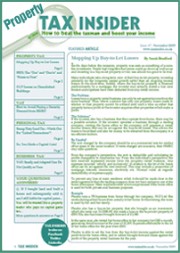Before you go, sign up to our free tax saving email course. Get 7 top property tax saving strategies in your email inbox that will help you save thousands in tax. Unsubscribe any time.
 Anyone who can afford to do so would like to help their children get a foot on the housing ladder. This article deals with some of the ways this can be achieved. It is assumed throughout that the “child” is over 18 years old, as things are much more complicated if they are younger than this. Anyone who can afford to do so would like to help their children get a foot on the housing ladder. This article deals with some of the ways this can be achieved. It is assumed throughout that the “child” is over 18 years old, as things are much more complicated if they are younger than this.The simplest way to give a home to a child is a gift of cash for the deposit on a house, or the full purchase price. Provided the parent making the gift survives for seven years after the gift, there are no tax consequences whatsoever. If the parent dies within the seven year period, then the sum gifted is treated as if it was still part of their estate and is charged to inheritance tax. There is, however, a “nil rate band” of the first £325.000 of value in the estate, which is applied first to gifts made in the preceding seven years, so unless you have been particularly generous in your gift, the only effect will be that your estate will pay more inheritance tax as a result of having used up some of the nil rate band. The same applies to all the other gifts mentioned in this article. The position is more complicated in a case where you already own the property concerned. If you simply gift it, you will be charged capital gains tax as if you had sold it at market value. Given the current state of the housing market, this may not be a problem, but if using market value would produce a capital gain, you will have to consider other strategies. One possibility, which may not always be practical, is to let the property as “furnished holiday accommodation” (FHA) before making the gift. FHA counts as a trading activity, and so it is possible for you and the child to make a joint claim to “hold over” the capital gain on the gift. When the child sells the property, they will only be able to deduct the original cost to you, but as the property will presumably be their main residence, their gain will be exempt from CGT in any case. It will take at least a year to qualify a property as FHA, because the rules defining FHA are drawn up in relation to a tax year. In order to qualify as FHA, the property must be let fully furnished for at least 15 weeks in the year, and it must be available for letting for at least 30 weeks. None of the lettings can be for more than 31 days to the same person, and the lettings must be “to the public generally” rather than to family and friends. If the idea is to gift an investment property to the child, rather than a property they will be living in, then there is another method of making a tax-free gift. The property is gifted to a “discretionary trust” (a legal entity a solicitor can set up for you). The trust holds the property for at least three months (don’t ask why, it’s too complicated!) and then transfers the property to the child. A gift to a discretionary trust is chargeable to inheritance tax and this means it is possible to claim hold over relief in a similar way to the gift of the FHA referred to above. Provided the value gifted is not more than the nil rate band of £325,000, no IHT is actually payable – or rather, it is payable at 0% - but this is enough to claim the hold over. The same applies to the trustees when they transfer the property to the child. Unlike a gift of a business asset such as FHA, however, using this gift technique means that the child will not be able to claim the exemption for a main residence on the gain that was held over when they eventually sell the property, so this strategy is perhaps more suitable for investment properties. Finally, a word of warning: If the property concerned is your own home and you continue to live in it after the gift, then on your death, it will be treated as still your property for inheritance tax. Practical Tip: You need to be careful when gifting property to your children – gifts of property are deemed to take place at market value, and without careful planning there may be significant tax liabilities as a result. This is a sample article from the monthly Property Tax Insider magazine. Go here to get your first free issue of Property Tax Insider.
|


 Tax Articles
Tax Articles